The Ultimate Guide to Applying to Carleton
Among the many private liberal-arts colleges in the United States, Carleton College stands out as a first-rank place to get your undergraduate education. To academically inclined students, it might sound like an intellectual paradise, as its undergraduate teaching is considered by many to be the best in the nation. It’s riddled with National Merit Scholars— 46 of them entered with the class of 2019 alone— and its graduates go on to receive an impressive number of doctoral degrees, Fulbright Scholarships, and other indications of academic prowess.
Carleton isn’t all about the brain, though. Campus life offers a vibrant slate of activities, extracurriculars, and social opportunities for students. If you’re a big fan of outdoor recreation, or if you’re just not interested in going to college in a big (or even a smaller) city, Carleton’s small-town location and environmentally active reputation may be just right for you. Then again, if you crave city experiences, the Twin Cities aren’t too far away.
Interested in applying to Carleton? Read on for more information about Carleton’s academic strength and competitive admissions process. We’ll walk you through the process of completing Carleton’s application and presenting yourself as a strong candidate for this unique school.
Introducing Carleton
Founded in 1866, Carleton is located in the rural (though currently urbanizing) town of Northfield, Minnesota, about forty miles away from the Twin Cities of Minneapolis and St. Paul. The 1,040-acre campus adjoins the 880-acre Cowling Arboretum, known as the Arb, which is also owned by the college and boasts an extensive trail system. Carleton shares Northfield with St. Olaf College, another private liberal arts college, which was founded just a few years after Carleton. Just over 2,000 students, all undergraduates, are enrolled at Carleton at a given time.
According to the popular U.S. News and World Reports rankings, Carleton is the eighth-best college in the United States in the National Liberal Arts Colleges category. Notably, these rankings also place Carleton as number one in undergraduate teaching quality among liberal arts schools. The college has been highly ranked by a number of other groups and publications as well.
Academically, Carleton is one of relatively few colleges in this country that use a trimester schedule instead of semesters or quarters. Typically, students take three courses during each of the 10-week-long Fall, Winter, and Spring terms. Carleton students can choose between 32 different majors in which to earn their Bachelor of Arts degrees, the most popular of which are in the social sciences and biological sciences. They can also choose to complete a concentration, which at Carleton is roughly equivalent to an academic minor, but this is not required.
Every Carleton student must complete a capstone project known as the Senior Integrative Experience within their major in order to graduate. In addition to the major, Carleton students must also complete a number of other requirements, including both specific courses and distribution requirements, in order to graduate with a broad liberal-arts education.
When they’re not studying, Carleton students participate in over a hundred student groups and activities, including athletics, cultural groups, and the performing arts. Carleton’s scenic location in rural Minnesota gives students the opportunity to pursue a wide range of outdoor activities all year round. The college is also known for its commitments to sustainability and environmental awareness; in fact, the majority of Carleton’s electrical power is generated by its own wind turbines.
Carleton Admissions Information
The Carleton first-year admission process is quite competitive. For the class of 2019, the most recent cohort for whom data is available, 1,344 students were accepted out of a pool of 6,721 applicants, resulting in an acceptance rate of 20%. 498 of those accepted students matriculated at Carleton in the fall of 2015.
Carleton is looking for students with a strong academic background, and most applicants far exceed Carleton’s minimum academic admission requirements on their transcripts. However, Carleton understands that not every high school offers the same educational opportunities to its students, and will look favorably upon applicants who take full advantage of whatever their school offers.
In addition to academics and test scores, Carleton bases admissions decisions on your involvement in activities and your community, your individual talents, and such qualities as leadership skills, “sense of humor”, and ability to “rise to a challenge” that you can bring to the Carleton community. Given its competitive acceptance rate, Carleton is not able to admit all qualified applicants.
Applications from students who wish to transfer from other colleges are also accepted. The process is generally quite similar to the application process for first-years, though transfer applicants will need to submit their college transcripts and may want to request newer letters of recommendation. However, the acceptance rate for transfers is quite low. Last year, Carleton only accepted 16 transfer applicants out of a pool of 195, for an acceptance rate of 8.2%.
Paying for Carleton
For the 2016-2017 school year, Carleton’s estimated cost of tuition and fees for an average student is $64,071. Of this amount, tuition alone accounts for $50,580. This figure does not take into account the cost of books, personal expenses, or travel to and from Carleton, which will vary for individual students.
At Carleton, approximately 54% of students receive financial aid. For the majority of students, this financial aid is entirely need-based. However, Carleton does participate in three specific merit-based financial aid programs: the National Merit Scholarship Program, the National Achievement Scholarship Program, and the National Hispanic Recognition Program. According to Carleton’s website, “students who are finalists in these programs are eligible for Carleton scholarships of $2,000 per year.”
Using the data applicants provide through the FAFSA, the CSS Profile, and the submission of federal income tax returns, Carleton calculates each family’s financial need based upon their individual circumstances, and creates a financial aid package designed to meet that need. Prospective applicants are encouraged to use Carleton’s Net Price Calculator to get a rough idea of how much aid their families might be eligible for.
The FAFSA and CSS Profile should be submitted along with each applicant’s admission application under whichever admissions plan they choose, the due dates for which we’ll go over below. These forms may be submitted using estimates if exact numbers are not yet available, as long as families update their applications once exact figures are known.
Students are not expected to submit their family’s tax returns until after they have been accepted and have paid the enrollment deposit; however, this means that financial aid awards are not considered to be finalized until after the student has already indicated that they will attend.
For international applicants to Carleton, financial aid options are unfortunately limited and must be applied for along with the admission application. No financial aid applications are considered from international students in their later years at Carleton; these students can assume that their financial aid will remain consistent over their four years at Carleton. More information about scholarships for international students can be found on the Carleton website.
An additional factor for which Carleton applicants need to be prepared is that the admissions process for all Carleton students is need-aware. This means that, for both domestic and international applicants, an applicant’s ability to pay for college may be a factor in whether or not they are accepted to Carleton. The need-aware policy is especially significant for international students, for whom there is a smaller financial aid budget.
To be clear, Carleton still has a substantial financial aid budget for domestic students and is able to offer need-based financial aid to many students. The need-aware admissions policy does not necessarily mean that you cannot apply to Carleton if you have financial need, or that you won’t be accepted to Carleton if you have financial need. However, you should definitely make sure you understand what this policy means for you before you apply.
The Carleton Application
If you’re interested in applying to Carleton, you have three options for filling out an application: the Common Application, the Coalition Application, and the QuestBridge application. We’ll go over what each of these application types requires of you later on in this section.
Using the Common App or the Coalition App, you can apply to Carleton under three main admissions plans: Fall Early Decision (comparable to Early Decision I elsewhere), Winter Early Decision (comparable to Early Decision II elsewhere), or Regular Decision. Application due dates for each admissions plan are as follows:
- Fall ED: Applications and financial aid materials must be submitted by November 15th, and decisions are made available by December 15th. This program is binding, meaning you must attend if accepted. You may not apply to any other schools under ED I plans if you apply to Carleton under the Fall ED plan.
- Winter ED: Applications and financial aid materials must be submitted by January 15th, and decisions are made available by February 15th. This program is binding, meaning you must attend if accepted.You may not apply to any other schools under ED II plans if you apply to Carleton under the Winter ED plan.
- RD: Applications and financial aid materials must be submitted by January 15th, and decisions are made available by April 1st. Late applications submitted after the January 15th due date may still be considered if space is still available in the matriculating class after the on-time applications are processed.
Carleton does also accept applications from transfer applicants. If you are a transfer applicant, you’ll use the Common App, and your application will differ slightly but not significantly from the process described below. Transfer applications are due by March 31st, and admissions decisions for transfer students are made available on May 15th.
Common Application
In order to apply to Carleton through the Common App, you’ll first need to set up an online account on the Common App website and fill out the basic questions asked by the Common App. For more instructions on how to navigate and fill out the Common App, check out the CollegeVine blog’s User’s Guide to the Common App, as well as our targeted posts on how to respond to the sections dedicated to your demographics, citizenship, grades, activities, awards, and essays.
You’ll then need to add Carleton College to your My Colleges list, using the method we describe in our User’s Guide. Once you’ve added Carleton, you’ll be able to fill out the questions in the Carleton supplement. To get to this supplement, go to your My Colleges list, click on Carleton, and you’ll see the screen below:
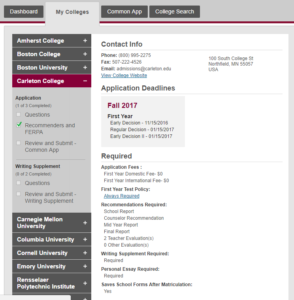
First, the application will require you to fill out some Carleton-specific questions, which we’ll describe below. To access these questions, look at the Carleton tab on the left side. Under the heading that says “Application,” click on “Questions.” You’ll see six tabs, labeled General, Academics, Activities, Contacts, Family, and Additional Information. Below, we’ll go over the questions contained in each of these categories.
For the General section, you’ll answer the following questions:
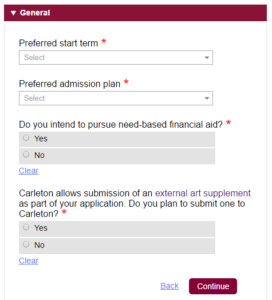
- Preferred start term: Choose Fall 2017 from the drop-down menu.
- Preferred admission plan: Choose Early Decision I, Early Decision II, or Regular Decision from the drop-down menu. Remember, in this context, Early Decision I is equivalent to Fall Early Decision, and Early Decision II is equivalent to Winter Early Decision.
- Do you intend to pursue need-based financial aid?: Select yes if you intend to apply for financial aid from Carleton, or no if you do not intend to do so.
- Carleton allows submission of an external art supplement as part of your application. Do you plan to submit one to Carleton?: Select yes or no— but first, check out our CollegeVine blog post on whether submitting an arts supplement is a good idea for you. If you do decide to submit an art supplement, you’ll need to do so separately from your Common App supplement.
For the Academics section, you’ll answer the following questions:
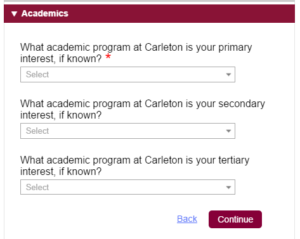
- What academic program at Carleton is your primary interest, if known?
- What academic program at Carleton is your secondary interest, if known?
- What academic program at Carleton is your tertiary interest, if known?
Each of these questions works the same way: you’ll choose your first, second, or third-choice academic interest at Carleton, respectively, from the drop-down menus. To answer these questions, you should first take a look at Carleton’s list of academic programs. While you can select Undecided, this question isn’t binding on you in any way, so just pick the subjects that interest you most.
For the Activities section, you’ll answer the following question:
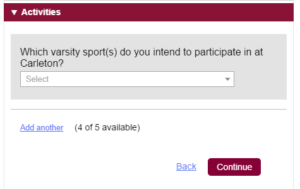
- Which varsity sport(s) do you intend to participate in at Carleton?: This question is not required, and you should only answer it if you would like to participate in one or more varsity sports at Carleton. Select your sport choice from the drop-down menu. To add another sport, click “Add another.” You can add up to five sports.
For the Contacts section, you’ll answer the following question:
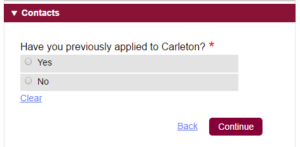
- Have you previously applied to Carleton College?: Select yes or no. If you select yes, you’ll be prompted to provide the month and year you previously applied to Carleton.
For the Family section, you’ll answer the following questions:
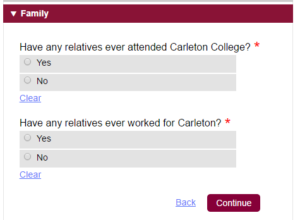
- Have any relatives ever attended Carleton College?: Select yes if you have any relatives who have attended Carleton; otherwise, select no. If you select yes, you’ll be prompted to answer another question: Are any of those relatives a parent, sibling, cousin, aunt, uncle, grandparent, great-grandparent, great-aunt/uncle or step-parent? If you answer yes for this question as well, you will be prompted to enter their name(s), relationship(s) to you, and the number of degrees they (each) received. You can add up to five relatives.
- Have any relatives ever worked for Carleton?: Select yes if you have any relatives who have been employed by Carleton; otherwise, select no. If you select yes, you’ll be prompted to answer another question: Are any of those relatives a parent, sibling, cousin, aunt, uncle, grandparent, great-grandparent, great-aunt/uncle or step-parent? If you answer yes, you will be prompted to enter their name(s), relationship(s) to you, and job information. You can add up to five relatives.
For the Additional Information section, you’ll see the following prompt:
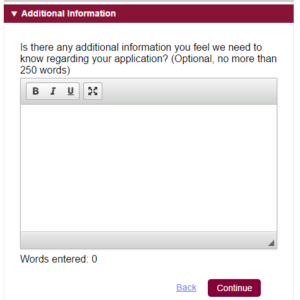
The prompt asks, “Is there any additional information you feel we need to know regarding your application?” Obviously, this section is not required, and not all applicants will need to use it. If you feel that you have special circumstances that deserve to be explained here, you can briefly describe those circumstances, but first, check out our CollegeVine blog post on how to talk about exceptional personal circumstances on your college applications.
When you’re finished with these questions, you’ll move on to Carleton’s writing supplement. Again, go to your My Colleges page and look on the left side under the Carleton tab. Under “Writing Supplement,” click on “Questions.” You’ll see the following:
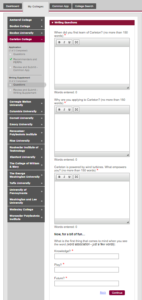
“When did you first learn of Carleton? (no more than 150 words)”
“Why are you applying to Carleton? (no more than 150 words)”
“Carleton is powered by wind turbines. What empowers you? (no more than 150 words)”
“Now, for a bit of fun…
What is the first thing that comes to mind when you see the word (word association – just a few words):
-Knowledge?
-Play?
-Future?”
As you can see, there are a combination of tradition “Why X College” questions and more unusual questions. For a detailed breakdown of how to answer the questions on the writing supplement, see our CollegeVine blog post, How to Write the Carleton College Essays 2016-2017.
Coalition Application
The Coalition App is another application system available for you to use when applying to Carleton, as well as the other Coalition App member schools. Created by the Coalition for Access, Affordability, and Success, and debuting for the 2016-2017 application season, this application system asks for much of the same basic information that you would submit if you were using the Common App.
However, the Coalition App’s differences may make it a more appealing option for you personally, and if you’re considering applying to a school that offers the Coalition App option, it’s a good idea to look at the Coalition App website to see how its approach to gathering admissions information is different from that used by the Common App.
As with the Common App, in order to explore and apply using the Coalition App, you’ll need to create a Coalition App account online. Once your account is created, you can set up your profile, fill out your basic information, and add Carleton as one of your colleges. Again, the Coalition App will ask you for much of the same information as the Common App would, but the two applications may differ in the way they ask you to submit information.
The Coalition App has its own set of essay prompts that are available to all applicants, and also offers applicants the opportunity to write an essay on any topic of their choice. For a detailed description of how to respond to each Coalition App essay prompt, you can take a look at the CollegeVine blog post on How to Write the Coalition Application Essays 2016-17.
QuestBridge Application
In addition to the Common App and the Coalition App, certain students can apply to Carleton through the organization QuestBridge. This program is designed to assist students from low-income backgrounds navigate the college application process and access some of the best colleges in the United States.
In order to apply to Carleton through QuestBridge, prospective students must first apply to the QuestBridge National College Match program and be named a Finalist in that program. They will then have the help of the QuestBridge organization in preparing their college applications, and should follow the instructions given to them by QuestBridge.
For 2016, the deadline to apply to QuestBridge itself is September 27th, and students named Finalists will submit their applications to Carleton by November 1st. Interested students can learn more about the QuestBridge National College Match program and how to apply to that program on the QuestBridge website.
Interviewing for Carleton
If possible, applicants to Carleton are encouraged to make an interview part of their application process. Applicants can interview either on campus with an admissions representative, in their own areas of residence with an alumni admissions representative, or in their own areas of residence during one of the interview days Carleton schedules in various locations.
In your application process, you’ll need to be proactive and contact Carleton directly to schedule your interview. Students who are able to visit campus can make an interview appointment (and sign up for other activities) on Carleton’s website. Those who are not able to visit campus can request an interview online with an alumni interviewer in their area, if one is available.
Carleton offers a limited number of interview days in other cities and countries, where students can sign up in advance to meet with a Carleton representative. Upcoming dates and locations can be found on their website.
Though interviewing is recommended if it’s possible for the student, the interview is not a required part of the application, and students who aren’t able to have an interview won’t be penalized in the application process. Carleton classifies its interviews as “informational” rather than “evaluative”, and sees them as an opportunity for the college to get to know you more personally while you get to know the college.
For more information about what to expect from a college interview, how to prepare, and some dos and don’ts, check out the CollegeVine blog!
Other Carleton Application Requirements
In addition to the Common App or Coalition App and the required Carleton supplement, you’ll need to submit the following to complete your application for undergraduate admission:
- Optional: The Carleton Part 1 application form, which you can fill out on the Carleton website to introduce yourself to Carleton and get your application started.
- Transcript, including your senior schedule and first-term senior grades when available.
- High school counselor recommendation, known on the Common App as the School Report.
- Two teacher recommendations, preferably from teachers of core academic subjects.
- Standardized test scores from the SAT or ACT. (The writing section for either of these tests is not required.) International applicants may also be required to submit TOEFL or IELTS scores.
- Optional: Any additional test scores, such as those from AP or SAT II tests.
As you may have noticed, there’s no application fee listed; that’s because applying online to Carleton is free, with no fee waiver necessary. If you plan to apply for financial aid, you’ll need to also submit your financial aid materials by the dates we discussed earlier in this post.
Hearing Back from Carleton
Each first-year admissions timeline at Carleton— Fall ED, Winter ED, and RD— has its own set of deadlines and notification dates. As we mentioned above, students applying through the QuestBridge program go through a slightly different application process, and should go by the dates given to them by the QuestBridge program.
Fall ED students receive their admissions decisions on December 15th, and must confirm their enrollment by January 15th if accepted. Winter ED students receive their admissions decisions on February 15th, and must confirm their enrollment by March 1st if accepted. Since Carleton’s early admissions programs are binding Early Decision programs, any students who are accepted under either Fall ED or Winter ED are contractually obligated to attend Carleton.
Students who are not accepted under the Fall ED or Winter ED program may either be rejected or deferred. If rejected, these applicants may not reapply in the later admission rounds of the same admission cycle, though they may apply as transfer students in the future.
If deferred, applicants will have their applications reconsidered along with the RD applicant pool and will receive their final decision with the other RD applicants. Deferred students are released from their contractual obligation to attend Carleton if they are accepted. Students deferred in the Fall ED round will be deferred to the RD round, not the Winter ED round.
Applicants who applied under the RD timeline, along with deferred applicants from either ED round, will receive their admissions decisions on April 1st. They may be accepted, rejected, or waitlisted at this time. If accepted, they must respond to confirm or deny that they will be attending Carleton by May 1st.
Transfer applicants will be notified of their admissions decisions by May 15th, as the number of transfer students Carleton can accept depends partially on how many first-year accepted applicants actually intend to enroll. Accepted transfer students must confirm their enrollment by June 1st.
For students who are accepted to Carleton under any of the admissions plans, there is a $300 enrollment fee requirement to confirm your place in the matriculating class. This payment is not applied to your first term bill; rather, $50 is considered a lifetime transcript fee and is not returned, and $250 is a deposit that is returned to you upon graduating from Carleton.
Deferrals and the Waitlist at Carleton
Students who apply in either the Fall ED or the Winter ED round at Carleton should consider the possibility that they’ll be deferred when ED decisions for that round are released. This isn’t necessarily the end–some deferred students will be accepted in the RD round–but it can be disheartening.
If you find that you’ve been deferred, you have some options. Many students write a letter to the college’s admissions office explaining that they are still interested in attending Carleton. You can also send along any new or updated information that is not on your original application, such as improved grades or test scores. However, you should also move forward with your applications to other schools.
When the RD admissions decisions are released, some students will find themselves on the waitlist. These students may be accepted to Carleton after May 1st (or even later in the summer) if there are spots left in the matriculating class. If you’re waitlisted at Carleton, you’ll need to actively contact the admissions office to confirm your spot on the waitlist, or you will be removed from it.
Since the availability of any spots in the class is uncertain, students on the waitlist should go forward with plans to attend another college, including submitting a (nonrefundable) deposit. However, like deferred applicants, waitlisted applicants can feel free to update Carleton’s admissions office about any new achievements or improvements not listed on their initial application. Carleton’s waitlist is not ranked, and a variety of factors will be considered if students are chosen from the waitlist for admission.
Can you see yourself as a Carleton student? You can learn more about Carleton on the college’s admissions website, where you’ll find a more detailed breakdown of what life at Carleton is like and what a Carleton education can offer you.
Whether you’re just starting to consider the college application process, or you’re a high-school senior who’s right in the thick of it, CollegeVine can help. Our blog contains breakdowns of every aspect of the application process, including specialized posts on applying to the most coveted schools. Our mentors can provide assistance with everything from composing your application essays, to putting together a competitive application, to improving your standardized test scores.
Curious about your chances of acceptance to your dream school? Our free chancing engine takes into account your GPA, test scores, extracurriculars, and other data to predict your odds of acceptance at over 500 colleges across the U.S. We’ll also let you know how you stack up against other applicants and how you can improve your profile. Sign up for your free CollegeVine account today to get started!

